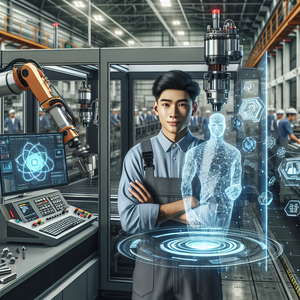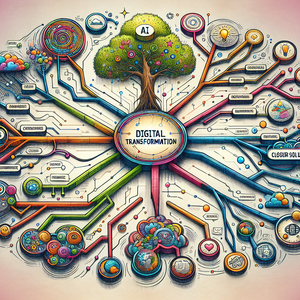The Influence of AI on Career Trends

AI is not just a tool; it is a catalyst for change in the workforce. As organizations seek to enhance efficiency, reduce costs, and leverage data for decision-making, AI technologies are being integrated into everyday operations. This shift necessitates a reevaluation of job roles, skill sets, and even the very nature of work itself. The implementation of AI has led to the emergence of new job titles, while also transforming traditional roles that now require a deeper understanding of technology. For example, roles such as data entry clerks and administrative assistants are being automated, leading to a decline in demand for these positions. Conversely, the rise of AI has resulted in a surge in demand for skilled professionals who can manage, develop, and implement AI technologies. This dynamic shift underscores the necessity for workers to adapt and acquire new skills that align with the emerging job market.
Top Five Careers Affected by AI
1. Data Scientist: As businesses generate vast amounts of data, the demand for data scientists has surged. These professionals analyze complex data sets to derive actionable insights, helping organizations make informed decisions. With AI, data scientists now utilize machine learning algorithms to improve predictive analytics, making their role more critical than ever. The ability to interpret and manipulate data effectively is essential for driving business success in an increasingly data-driven landscape. 2. AI Ethicist: The rise of AI brings ethical considerations to the forefront. AI ethicists are responsible for ensuring that AI technologies are developed and implemented responsibly, addressing issues like bias, privacy, and accountability. This emerging role emphasizes the importance of human oversight in AI deployment, making it essential for organizations committed to ethical practices. As companies face scrutiny over AI's impact on society, the demand for professionals who can navigate these ethical dilemmas will continue to grow. 3. Automation Specialist: As automation becomes more prevalent, businesses need specialists to design, implement, and maintain automated systems. Automation specialists work closely with AI technologies to streamline processes, improve efficiency, and reduce human error. Their expertise is crucial in industries ranging from manufacturing to customer service. By automating repetitive tasks, these specialists free up human employees to focus on more strategic initiatives, enhancing overall productivity. 4. AI Trainer: AI systems require training to function effectively. AI trainers, often with backgrounds in data science or machine learning, are responsible for feeding algorithms with the right data, ensuring they learn accurately. This role is vital in sectors where AI applications are rapidly expanding, such as healthcare and finance. The ability to curate and prepare data sets will determine the effectiveness of AI systems, making AI trainers indispensable in the development process. 5. Chatbot Developer: With the rise of conversational AI, chatbot developers are in high demand. These professionals design and implement chatbots that enhance customer interaction and streamline service delivery. As businesses increasingly turn to AI-driven solutions, the need for skilled developers who can create intuitive, responsive chatbots continues to grow. The ability to create seamless user experiences through chatbots is a valuable skill in the age of digital customer service.
Supporting Examples and Evidence
The impact of AI on career trends is evident in numerous studies and industry reports. For instance, a report by the World Economic Forum predicts that by 2025, 85 million jobs may be displaced by a shift in labor between humans and machines, while 97 million new roles may emerge that are more adapted to the new division of labor. Moreover, a survey conducted by LinkedIn found that AI-related job postings increased by 74% over the past four years, underscoring the demand for AI-savvy professionals. Additionally, companies like Google and IBM are actively investing in AI training programs to equip their workforce with the necessary skills to adapt to these changes. This proactive approach not only addresses the skills gap but also highlights the importance of continuous learning in an AI-driven job market. The adaptation of educational institutions to include AI-related curricula further emphasizes the necessity for future professionals to be equipped with relevant skills.
Artificial intelligence is not merely a trend; it is a transformative force reshaping the workforce and redefining career paths. By understanding the influence of AI on career trends, professionals can better prepare themselves for the future of work. The emergence of roles such as data scientists, AI ethicists, automation specialists, AI trainers, and chatbot developers illustrates the potential for growth in the job market as technology continues to advance. As we embrace this new era, individuals must cultivate the skills needed to thrive in an AI-driven landscape, ensuring they remain relevant and competitive in their chosen fields. Continuous learning, adaptability, and a willingness to embrace change will be crucial for success in the evolving job market of the 21st century. The integration of AI into the workforce not only represents a shift in job roles but also offers an opportunity for innovation and growth across all sectors.
Machine Learning Engineer
Google, Facebook, Amazon
Core Responsibilities
Develop and optimize machine learning models to enhance predictive capabilities.
Collaborate with data scientists to implement algorithms that improve accuracy and efficiency.
Conduct experiments to evaluate model performance and iterate based on results.
Required Skills
Proficiency in programming languages such as Python or R; experience with machine learning libraries like TensorFlow or PyTorch.
Strong understanding of statistical analysis and data processing techniques.
Experience with cloud platforms (AWS, Azure) for deploying machine learning solutions.
AI Policy Analyst
Think tanks, government agencies, technology companies
Core Responsibilities
Analyze and assess the societal impacts of AI technologies and recommend policies for ethical usage.
Work with legal and compliance teams to ensure AI implementations adhere to regulations.
Conduct research on emerging AI trends and their implications for industry standards.
Required Skills
Strong background in public policy, law, or ethics, particularly in technology.
Excellent analytical skills with the ability to interpret complex data and legislation.
Strong communication skills to convey findings to diverse audiences, including stakeholders and policymakers.
Robotics Process Automation (RPA) Developer
Accenture, Deloitte, Capgemini
Core Responsibilities
Design and develop RPA solutions to automate routine business processes.
Collaborate with business analysts to identify automation opportunities and gather requirements.
Monitor and maintain RPA systems to ensure they function effectively and efficiently.
Required Skills
Proficiency in RPA tools such as UiPath or Automation Anywhere.
Strong programming skills, particularly in languages like Java or C#.
Understanding of business processes and workflows to identify automation potentials.
Natural Language Processing (NLP) Engineer
Microsoft, IBM, startups focusing on AI-driven communication solutions
Core Responsibilities
Create algorithms that enable machines to understand and interpret human language.
Develop applications for sentiment analysis, chatbots, and voice recognition systems.
Test and refine models to improve accuracy in language processing tasks.
Required Skills
Strong knowledge of NLP libraries (NLTK, spaCy) and machine learning frameworks.
Experience with text mining, linguistic data analysis, and deep learning techniques.
Familiarity with programming languages such as Python or Java.
AI Product Manager
Tech giants (Apple, Google), AI startups, and product development firms
Core Responsibilities
Oversee the development and launch of AI-driven products, ensuring alignment with business strategies.
Collaborate with cross-functional teams including engineering, data science, and marketing to deliver features.
Conduct market research to identify customer needs and assess competitive landscape.
Required Skills
Strong project management skills with experience in Agile methodologies.
Excellent understanding of AI and machine learning principles to guide product development.
Strong analytical skills to derive insights from user feedback and product performance data.


